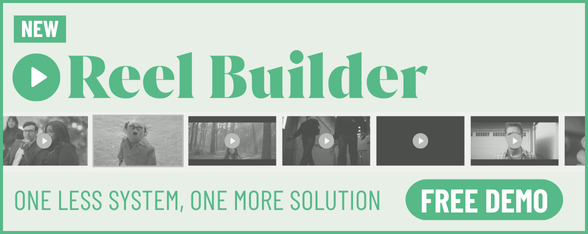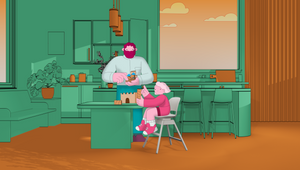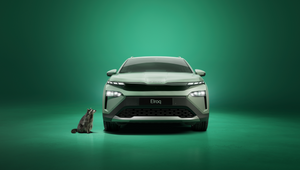
Talking Visual Effects in the ‘Creative Village’ of Amsterdam

Like so many of Amsterdam’s creative professionals, Ricky Weissman is an immigrant. Growing up in New York City with a passion for technology and storytelling, he managed to maneuver himself into possibly the best job there is for combining those things - visual effects. After many years plying his trade in the USA, Ricky moved to Europe two years ago to become a VFX Supervisor at MPC Amsterdam. Since then he’s played a part in making sure some stunning pieces of work look their best, like Nike ‘Lock In. Let Loose’ and Diesel ‘Make Love Not Walls’.
LBB’s Alex Reeves caught up with him to find out what’s behind this artistically-minded tech wizard.
LBB> Where did you grow up and what were you like as a kid?
RW> I was born in Brooklyn, NYC and at that time Brooklyn was falling into a dark period. Raising children was becoming a bit dangerous in a majority of the neighborhoods there. We lived in a place called Canarsie, the last stop on the L train. As part of a concerted effort to provide my sister and myself a better education, my parents whisked us out to the suburbs of Long Island at quite a young age. This is where I really ‘grew up.’ As a kid, I was always into creating art. I loved writing and drawing, but mostly excelled at causing trouble. I was a class clown and would take severe hits for a good laugh. That was oddly very important to me at the time.
LBB> How did you first get into VFX?
RW> I’ve always been a fan of VFX in movies and I had a real love for cameras, computers and tech, but it’s my older cousin back in New York who I have to thank for introducing me to the industry. The idea that this was something that I could do as a career became clear at the right place and right time in my life.
LBB> Where did you begin your career?
RW> It all started at Quietman back in the mid-nineties, a boutique VFX studio in NYC. The owner, who learned to harness his craft at The Jim Henson Company working on The Muppets, took me under his wing and offered me an apprenticeship. I did endless night shifts with other college students on a late-night preparation team. It was there that I was able to pick up the introductory tricks of the trade – you couldn’t learn this stuff at school back then. There was no VFX degree, it was all in its infancy.
One thing I want to emphasise to an artist starting out, is that simply doing the job well is only going to get you halfway to your goal in this industry. My personal forte is understanding where people are coming from, and helping them to turn the ideas in their head into moving images. That's not something that is easily taught. I learned those chops from working in restaurants, bars, and retail during my college years – that taught me the crucial ability to problem solve, a huge part of what we do on a day-to-day basis.
LBB> You moved to Amsterdam a couple of years ago. What was the most striking thing about the change?
RW> The darkness and the light. The extreme difference in the light between the winter and summer months was something I was not prepared for. In NYC, the winters are freezing, but there is always sun. Here in Amsterdam the city is much like the Phoenix: when the winter comes - and it comes swiftly - we all seem to let some part of ourselves go into the darkness. People have different methods for combating this time of year. But once the winter passes, the city is ‘born again’ into a wonderful place of colour and light. People are out and about all morning, way into the wee hours of the night. There is such a unique pulse and energy in this city, generated by the transient nature of its citizens. Ideas come and go in this town, and it makes for a very interesting backdrop to an artistic life.
LBB> Is there anything you particularly miss about NYC?
RW> Other than the obvious – family, close friends – I find that I miss the food more than I was expecting. It’s pretty hard to compete with New York concerning food, but the fact that you could find anything you wanted to eat, at pretty much any hour of the day, was a wonderful luxury.
LBB> How do you feel the Amsterdam office fits into MPC's global family? What are your specialisms? Do you have a particular style or vibe?
RW> The Amsterdam studio is a bit different to the rest of MPC's global family. The size of Amsterdam and the way of life in this city is a bit different, so of course the demand for relationships is different as well. We find that the ‘boutique’ style of VFX studio works better here. It means people can stop by, and have a chat about their ideas. That way, we are introduced into the creative circle earlier - and that is a very nice feeling.
I also find that being in a smaller city means that you have deeper relationships with people working and socialising. It’s a bit of a creative village where you see the people you work with all over town. Back in New York, I would rarely meet the families of our clients, but here it is very common, and pleasant, to see people out and about on a Saturday afternoon. There is a certain charm that comes with it.
With my personal style, I’m a bit old-school, I am classically trained in fine art. This is a huge advantage, I think, as there’s an increasing number of people who have technical training but often do not grasp the importance of theory. I often hear that something is ‘technically correct’, but if it doesn't look right, that is irrelevant. We are in the business of aesthetics and feelings, we move people with emotions – the machines we work with are our tools, and should only help us to manifest our ideas into reality. This is a very important detail.
LBB> As a VFX person, what should directors be aware of to make sure you do the best possible job for them?
RW> Consult with us. We are here for the sole purpose of helping them to realise their vision.
LBB> What pieces of work are you proudest of and why?
RW> Since moving to Amsterdam it’s got to be Nike Russia’s ‘What Are Girls Made Of?’ The piece focused on gender empowerment, and the production was a truly creative and brilliant experience from start to finish. Particularly because the film contained a positive message that I could stand by ethically and artistically. Not to mention, it won several awards this year at Cannes and the crew that worked on it was top-notch!
LBB> What are the biggest influences on the way you work?
RW> In the business of VFX, everything needs to be finished five minutes ago. The only way to ride the ever-increasing tight deadlines and creative demand is to keep super-organized from day one. Also, a big part of working well within a global company, working on productions on an enormous scale, is knowing how to communicate with colleagues worldwide. Face-to-face contact is really important, where possible. We love a good debate at MPC, and a lot of experimentation; it’s healthy and keeps us pushing for better creative results.
LBB> You were a freelance Flame/Inferno artist for many years before coming in-house. What does that shift feel like?
RW> The shift is intense at first. Managing your own schedule certainly has its perks but the biggest advantage of being in-house is the ‘open door’ of trust and access. As a freelancer, you simply come and go from place to place and you are more reliant on your own personal bag of tricks – which unfortunately only grows at your own speed. Since joining MPC Amsterdam, I now have access to everyone’s bag of tricks, and it is a very extensive group of information and know-how. The company really does a brilliant job at helping you to connect with the resources you need.
LBB> Creatively, what has been your most challenging project at MPC Amsterdam?
RW> The ‘Unboxing’ ad for the Samsung S7 Phone was wonderful as it traced the history of cellular devices all the way back to the ‘80s - talk about nostalgia! The timings were tight and to pull it off, we brought together our crew from around the world and got them into one place. The way we can scale up in such a rapid and extreme way to meet a tight deadline is unreal.
LBB> What do you think are some of the most interesting or creative ads to come out of Amsterdam agencies since you’ve been there?
RW> Heineken 'The Trailblazers' would have to be my pick as far as bang is concerned. Being one of the biggest brands in Amsterdam gives them more freedom to create proper epics. Personally, I’m a fan of character-driven ads and the local production crews and directors here have a really nice eye for this kind of thing. I constantly find myself impressed with their eyes for aesthetics.
LBB> Where do you draw inspiration from, outside of your career? Any interesting hobbies?
RW> I am a storyteller by trade, and still enjoy writing and drawing on the side. I write children’s books and create art in my spare time. My influences come from my time at the School of Visual Arts in New York City in the late 1990s and for me, these years were the last years that the city still had its edge. The madness of the city was just outside of our school campus doors. It was a really interesting time to be living there. The school dorm was 50% students and 50% mental patients. Needless to say these were very formative years, nights were filled with leaping from rooftops and gallivanting up scaffolding. The city had become our playground.
The difficulty with living in New York is the very thing that made you want to stay there. You had to learn how to talk to people and how to connect with those around you, or you weren't going to make it very long. There was always something to do at any time of night, and I was an extreme night owl for a very long time. All of that being said, the most interesting inspiration for me comes from the people I meet along the ride. Everyone is so uniquely different in this world, and yet sometimes exactly the same.
It is these dualities that I love to witness, create with, and ultimately use as a tool in moving forward.















